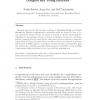Free Online Productivity Tools
i2Speak
i2Symbol
i2OCR
iTex2Img
iWeb2Print
iWeb2Shot
i2Type
iPdf2Split
iPdf2Merge
i2Bopomofo
i2Arabic
i2Style
i2Image
i2PDF
iLatex2Rtf
Sci2ools
100
Voted
IANDC
2010
2010
Parameterized computational complexity of Dodgson and Young elections
We show that the two NP-complete problems of Dodgson Score and Young Score have differing computational complexities when the winner is close to being a Condorcet winner. On the one hand, we present an efficient fixed-parameter algorithm for determining a Condorcet winner in Dodgson elections by a minimum number of switches in the votes. On the other hand, we prove that the corresponding problem for Young elections, where one has to delete votes instead of performing switches, is W[2]-complete. In addition, we study Dodgson elections that allow ties between the candidates and give fixed-parameter tractability as well as W[2]completeness results depending on the cost model for switching ties. Key words: computational social choice, voting systems, winner determination, fixed-parameter tractability, W[2]-completeness
| Added | 25 Jan 2011 |
| Updated | 25 Jan 2011 |
| Type | Journal |
| Year | 2010 |
| Where | IANDC |
| Authors | Nadja Betzler, Jiong Guo, Rolf Niedermeier |
Comments (0)

